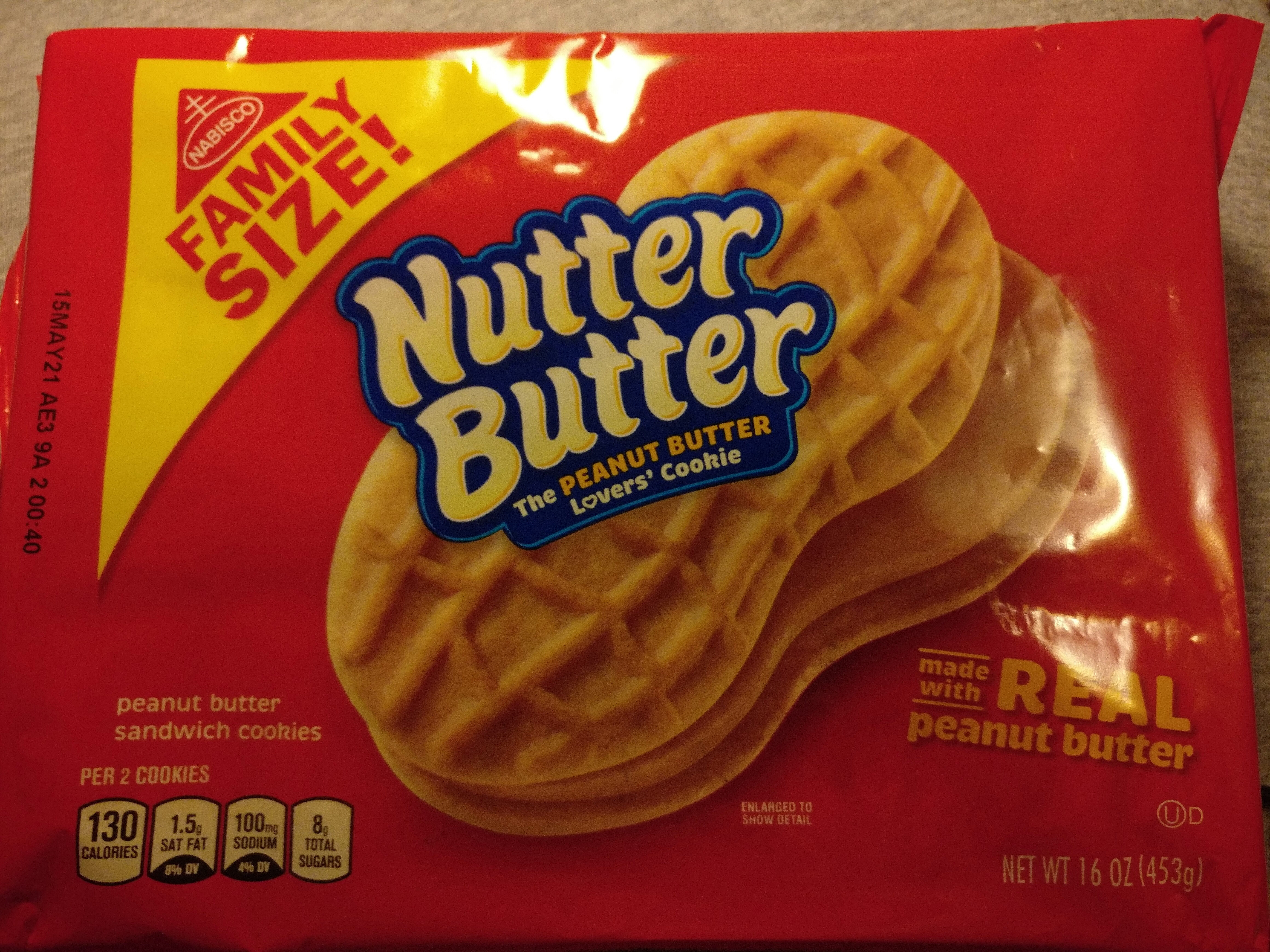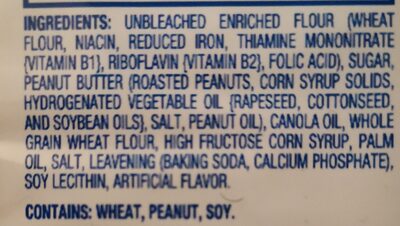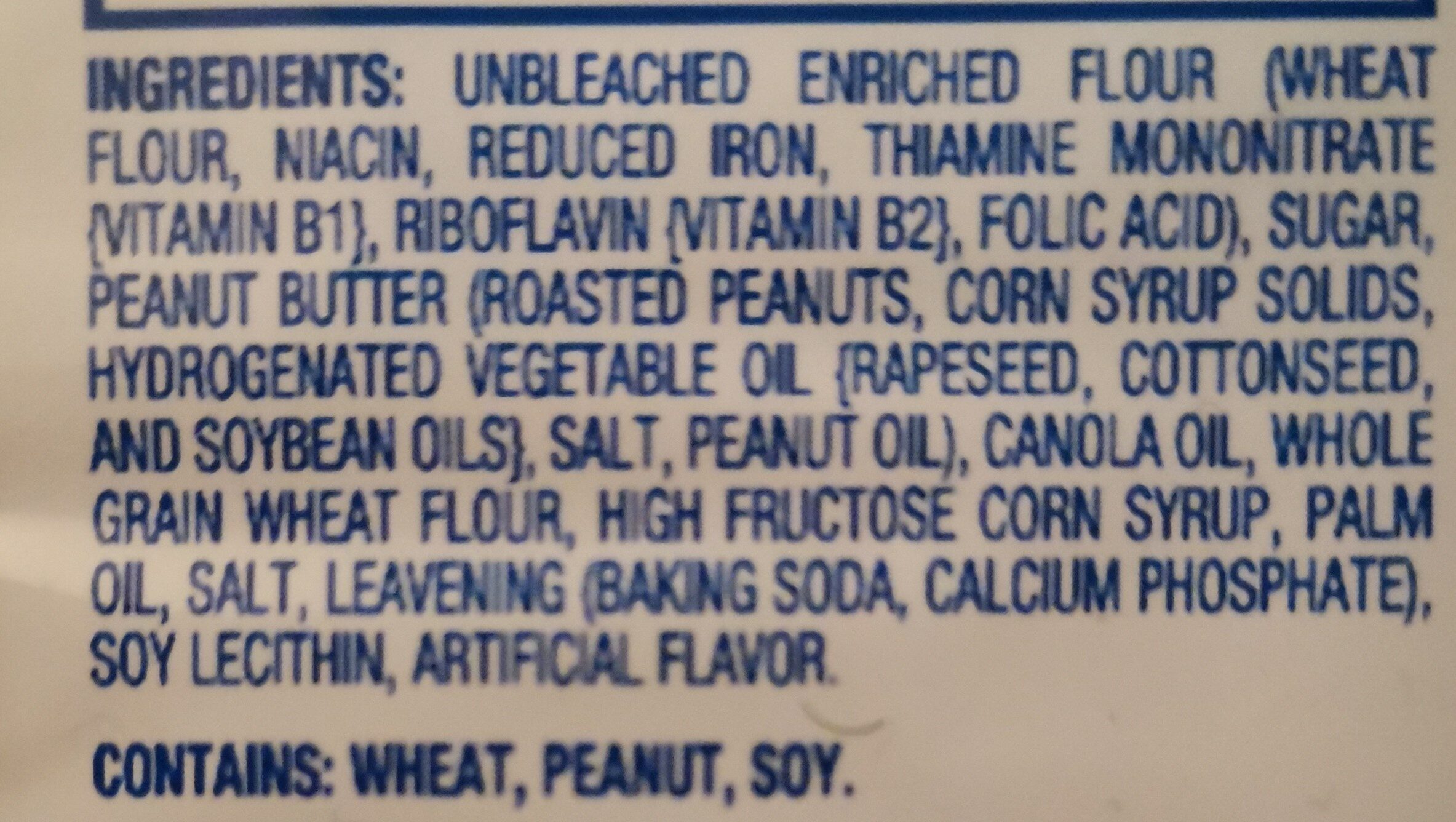Help us make food transparency the norm!
As a non-profit organization, we depend on your donations to continue informing consumers around the world about what they eat.
The food revolution starts with you!
Nutter Butter - Nabisco - 1.6 oz (453 g)
Nutter Butter - Nabisco - 1.6 oz (453 g)
This product page is not complete. You can help to complete it by editing it and adding more data from the photos we have, or by taking more photos using the app for Android or iPhone/iPad. Thank you!
×
Barcode: 0044000046316 (EAN / EAN-13) 044000046316 (UPC / UPC-A)
Common name: peanut butter sandwich cookies.
Quantity: 1.6 oz (453 g)
Brands: Nabisco
Brand owner: Mondelez Int. US (0074819091009)
Categories: Snacks, Sweet snacks, Biscuits and cakes, Biscuits, Filled biscuits
Labels, certifications, awards:
Kosher, Orthodox Union Kosher
Origin of ingredients: United States
Manufacturing or processing places: Northfield, Illinois, Estados Unidos
Traceability code: 080503190204
Link to the product page on the official site of the producer: https://www.mondelezinternational.com/
Countries where sold: Bolivia, United States
Matching with your preferences
Health
Ingredients
-
29 ingredients
UNBLEACHED ENRICHED FLOUR (WHEAT FLOUR, NIACIN, REDUCED IRON, THIAMINE MONONITRATE (VITAMIN B1), RIBOFLAVIN (VITAMIN B2), FOLIC ACID), SUGAR, PEANUT BUTTER [ROASTED PEANUTS, CORN SYRUP SOLIDS, HYDROGENATED VEGETABLE OIL (RAPESEED OIL, COTTONSEED OIL, SOYBEAN OIL), SALT, PEANUT OIL], CANOLA OIL, WHOLE GRAIN WHEAT FLOUR, HIGH FRUCTOSE CORN SYRUP, PALM OIL, SALT, LEAVENING (BAKING SODA, CALCIUM PHOSPHATE), SOY LECITHIN, ARTIFICIAL FLAVOR.Allergens: Gluten, Peanuts, Soybeans
Food processing
-
Ultra processed foods
Elements that indicate the product is in the 4 - Ultra processed food and drink products group:
- Additive: E322 - Lecithins
- Ingredient: Flavouring
- Ingredient: Glucose
- Ingredient: High fructose corn syrup
- Ingredient: Hydrogenated oil
Food products are classified into 4 groups according to their degree of processing:
- Unprocessed or minimally processed foods
- Processed culinary ingredients
- Processed foods
- Ultra processed foods
The determination of the group is based on the category of the product and on the ingredients it contains.
Additives
-
E322 - Lecithins
Lecithins are natural compounds commonly used in the food industry as emulsifiers and stabilizers.
Extracted from sources like soybeans and eggs, lecithins consist of phospholipids that enhance the mixing of oil and water, ensuring smooth textures in various products like chocolates, dressings, and baked goods.
They do not present any known health risks.
-
E322i - Lecithin
Lecithins are natural compounds commonly used in the food industry as emulsifiers and stabilizers.
Extracted from sources like soybeans and eggs, lecithins consist of phospholipids that enhance the mixing of oil and water, ensuring smooth textures in various products like chocolates, dressings, and baked goods.
They do not present any known health risks.
-
E341 - Calcium phosphates
Calcium phosphate: Calcium phosphate is a family of materials and minerals containing calcium ions -Ca2+- together with inorganic phosphate anions. Some so-called calcium phosphates contain oxide and hydroxide as well. They are white solids of nutritious value.Source: Wikipedia
-
E500 - Sodium carbonates
Sodium carbonates (E500) are compounds commonly used in food preparation as leavening agents, helping baked goods rise by releasing carbon dioxide when they interact with acids.
Often found in baking soda, they regulate the pH of food, preventing it from becoming too acidic or too alkaline. In the culinary world, sodium carbonates can also enhance the texture and structure of foods, such as noodles, by modifying the gluten network.
Generally recognized as safe, sodium carbonates are non-toxic when consumed in typical amounts found in food.
-
E500ii - Sodium hydrogen carbonate
Sodium hydrogen carbonate, also known as E500ii, is a food additive commonly used as a leavening agent.
When added to recipes, it releases carbon dioxide gas upon exposure to heat or acids, causing dough to rise and resulting in a light, fluffy texture in baked goods.
It is generally recognized as safe (GRAS) by regulatory authorities when used in appropriate quantities and poses no significant health risks when consumed in typical food applications.
Ingredients analysis
-
Palm oil
Ingredients that contain palm oil: Palm oil
-
Vegan status unknown
Unrecognized ingredients: Reduced iron, Thiamin mononitrate, Thiamin, Folic acid
-
Vegetarian status unknown
Unrecognized ingredients: Reduced iron, Thiamin mononitrate, Thiamin, Folic acid
-
Details of the analysis of the ingredients
: FLOUR (WHEAT FLOUR, NIACIN, REDUCED IRON, THIAMINE MONONITRATE (VITAMIN B1), RIBOFLAVIN (VITAMIN B2), FOLIC ACID), SUGAR, PEANUT BUTTER (ROASTED PEANUTS, CORN SYRUP SOLIDS, HYDROGENATED VEGETABLE OIL (RAPESEED OIL, COTTONSEED OIL, SOYBEAN OIL), SALT, PEANUT OIL), CANOLA OIL, WHOLE GRAIN WHEAT FLOUR, HIGH FRUCTOSE CORN SYRUP, PALM OIL, SALT, LEAVENING (BAKING SODA, CALCIUM PHOSPHATE), SOY LECITHIN, ARTIFICIAL FLAVOR- FLOUR -> en:flour - vegan: yes - vegetarian: yes - ciqual_proxy_food_code: 9410 - percent_min: 9.09090909090909 - percent_max: 100
- WHEAT FLOUR -> en:wheat-flour - vegan: yes - vegetarian: yes - ciqual_proxy_food_code: 9410 - percent_min: 1.51515151515152 - percent_max: 100
- NIACIN -> en:e375 - vegan: maybe - vegetarian: maybe - percent_min: 0 - percent_max: 50
- REDUCED IRON -> en:reduced-iron - percent_min: 0 - percent_max: 33.3333333333333
- THIAMINE MONONITRATE -> en:thiamin-mononitrate - percent_min: 0 - percent_max: 25
- VITAMIN B1 -> en:thiamin - percent_min: 0 - percent_max: 25
- RIBOFLAVIN -> en:e101 - vegan: maybe - vegetarian: yes - percent_min: 0 - percent_max: 20
- VITAMIN B2 -> en:e101 - vegan: maybe - vegetarian: yes - percent_min: 0 - percent_max: 20
- FOLIC ACID -> en:folic-acid - percent_min: 0 - percent_max: 16.6666666666667
- SUGAR -> en:sugar - vegan: yes - vegetarian: yes - ciqual_proxy_food_code: 31016 - percent_min: 0 - percent_max: 28.6
- PEANUT BUTTER -> en:peanut-paste - vegan: yes - vegetarian: yes - ciqual_food_code: 15001 - percent_min: 0 - percent_max: 28.6
- ROASTED PEANUTS -> en:roasted-peanuts - vegan: yes - vegetarian: yes - ciqual_food_code: 15037 - percent_min: 0 - percent_max: 28.6
- CORN SYRUP SOLIDS -> en:corn-syrup-solids - vegan: yes - vegetarian: yes - ciqual_proxy_food_code: 31089 - percent_min: 0 - percent_max: 14.3
- HYDROGENATED VEGETABLE OIL -> en:hydrogenated-vegetable-oil - vegan: yes - vegetarian: yes - from_palm_oil: maybe - percent_min: 0 - percent_max: 9.53333333333333
- RAPESEED OIL -> en:rapeseed-oil - vegan: yes - vegetarian: yes - from_palm_oil: no - percent_min: 0 - percent_max: 9.53333333333333
- COTTONSEED OIL -> en:cottonseed-oil - vegan: yes - vegetarian: yes - from_palm_oil: no - ciqual_food_code: 17170 - percent_min: 0 - percent_max: 4.76666666666667
- SOYBEAN OIL -> en:soya-oil - vegan: yes - vegetarian: yes - from_palm_oil: no - ciqual_food_code: 17420 - percent_min: 0 - percent_max: 3.17777777777778
- SALT -> en:salt - vegan: yes - vegetarian: yes - ciqual_food_code: 11058 - percent_min: 0 - percent_max: 0.938
- PEANUT OIL -> en:peanut-oil - vegan: yes - vegetarian: yes - from_palm_oil: no - ciqual_food_code: 17040 - percent_min: 0 - percent_max: 0.938
- CANOLA OIL -> en:canola-oil - vegan: yes - vegetarian: yes - from_palm_oil: no - percent_min: 0 - percent_max: 25
- WHOLE GRAIN WHEAT FLOUR -> en:whole-wheat-flour - vegan: yes - vegetarian: yes - ciqual_proxy_food_code: 9410 - percent_min: 0 - percent_max: 20
- HIGH FRUCTOSE CORN SYRUP -> en:high-fructose-corn-syrup - vegan: yes - vegetarian: yes - ciqual_food_code: 31077 - percent_min: 0 - percent_max: 16.6666666666667
- PALM OIL -> en:palm-oil - vegan: yes - vegetarian: yes - from_palm_oil: yes - ciqual_food_code: 16129 - percent_min: 0 - percent_max: 14.2857142857143
- SALT -> en:salt - vegan: yes - vegetarian: yes - ciqual_food_code: 11058 - percent_min: 0 - percent_max: 0.938
- LEAVENING -> en:raising-agent - percent_min: 0 - percent_max: 0.938
- BAKING SODA -> en:e500ii - vegan: yes - vegetarian: yes - percent_min: 0 - percent_max: 0.938
- CALCIUM PHOSPHATE -> en:e341 - vegan: yes - vegetarian: yes - percent_min: 0 - percent_max: 0.469
- SOY LECITHIN -> en:soya-lecithin - vegan: yes - vegetarian: yes - ciqual_food_code: 42200 - percent_min: 0 - percent_max: 0.938
- ARTIFICIAL FLAVOR -> en:artificial-flavouring - vegan: maybe - vegetarian: maybe - percent_min: 0 - percent_max: 0.938
- FLOUR -> en:flour - vegan: yes - vegetarian: yes - ciqual_proxy_food_code: 9410 - percent_min: 9.09090909090909 - percent_max: 100
Nutrition
-
Poor nutritional quality
⚠ ️Warning: the amount of fruits, vegetables and nuts is not specified on the label, it was estimated from the list of ingredients: 22This product is not considered a beverage for the calculation of the Nutri-Score.
Positive points: 3
- Proteins: 4 / 5 (value: 7.14, rounded value: 7.14)
- Fiber: 3 / 5 (value: 3.57, rounded value: 3.57)
- Fruits, vegetables, nuts, and colza/walnut/olive oils: 0 / 5 (value: 22.7272727272727, rounded value: 22.7)
Negative points: 20
- Energy: 5 / 10 (value: 1940, rounded value: 1940)
- Sugars: 6 / 10 (value: 28.6, rounded value: 28.6)
- Saturated fat: 5 / 10 (value: 5.36, rounded value: 5.4)
- Sodium: 4 / 10 (value: 375, rounded value: 375)
The points for proteins are not counted because the negative points are greater or equal to 11.
Nutritional score: (20 - 3)
Nutri-Score:
-
Nutrient levels
-
Fat in high quantity (21.4%)
What you need to know- A high consumption of fat, especially saturated fats, can raise cholesterol, which increases the risk of heart diseases.
Recommendation: Limit the consumption of fat and saturated fat- Choose products with lower fat and saturated fat content.
-
Saturated fat in high quantity (5.36%)
What you need to know- A high consumption of fat, especially saturated fats, can raise cholesterol, which increases the risk of heart diseases.
Recommendation: Limit the consumption of fat and saturated fat- Choose products with lower fat and saturated fat content.
-
Sugars in high quantity (28.6%)
What you need to know- A high consumption of sugar can cause weight gain and tooth decay. It also augments the risk of type 2 diabetes and cardio-vascular diseases.
Recommendation: Limit the consumption of sugar and sugary drinks- Sugary drinks (such as sodas, fruit beverages, and fruit juices and nectars) should be limited as much as possible (no more than 1 glass a day).
- Choose products with lower sugar content and reduce the consumption of products with added sugars.
-
Salt in moderate quantity (0.938%)
What you need to know- A high consumption of salt (or sodium) can cause raised blood pressure, which can increase the risk of heart disease and stroke.
- Many people who have high blood pressure do not know it, as there are often no symptoms.
- Most people consume too much salt (on average 9 to 12 grams per day), around twice the recommended maximum level of intake.
Recommendation: Limit the consumption of salt and salted food- Reduce the quantity of salt used when cooking, and don't salt again at the table.
- Limit the consumption of salty snacks and choose products with lower salt content.
-
-
Nutrition facts
Nutrition facts As sold
for 100 g / 100 mlAs sold
per serving (2 cookies 28 g)Compared to: Filled biscuits Energy 1,940 kj
(464 kcal)544 kj
(130 kcal)-1% Energy from fat 746 kj
(178 kcal)209 kj
(50 kcal)+5% Fat 21.4 g 6 g +10% Saturated fat 5.36 g 1.5 g -36% Monounsaturated fat 5.36 g 1.5 g -33% Polyunsaturated fat 7.14 g 2 g +183% Trans fat 0 g 0 g -100% Cholesterol 0 mg 0 mg -100% Carbohydrates 67.9 g 19 g +2% Sugars 28.6 g 8 g -14% Fiber < 3.57 g < 1 g +24% Proteins 7.14 g 2 g +27% Salt 0.938 g 0.262 g +73% Vitamin A 0 µg 0 µg (0 % DV) Vitamin C (ascorbic acid) 0 mg 0 mg (0 % DV) -100% Calcium 0 mg 0 mg (0 % DV) -100% Iron 2.57 mg 0.72 mg (4 % DV) -27% Fruits‚ vegetables‚ nuts and rapeseed‚ walnut and olive oils (estimate from ingredients list analysis) 22.727 % 22.727 %
Environment
-
Eco-Score C - Moderate environmental impact
⚠ ️Select a country in order to include the full impact of transportation.The Eco-Score is an experimental score that summarizes the environmental impacts of food products.→ The Eco-Score was initially developped for France and it is being extended to other European countries. The Eco-Score formula is subject to change as it is regularly improved to make it more precise and better suited to each country.Life cycle analysis
-
Average impact of products of the same category: B (Score: 69/100)
Category: Biscuit (cookie)
Category: Biscuit (cookie)
- PEF environmental score: 0.35 (the lower the score, the lower the impact)
- including impact on climate change: 2.88 kg CO2 eq/kg of product
Stage Impact Agriculture
80.5 %Processing
11.8 %Packaging
3.1 %Transportation
3.2 %Distribution
1.4 %Consumption
0.0 %
Bonuses and maluses
-
Origins of ingredients with a medium impact
Bonus: +1
Environmental policy: +1
Transportation: 0
Origin of the product and/or its ingredients % of ingredients Impact United States 100 %Medium
-
Ingredients that threatens species
Malus: -10
Contains palm oil
Tropical forests in Asia, Africa and Latin America are destroyed to create and expand oil palm tree plantations. The deforestation contributes to climate change, and it endangers species such as the orangutan, the pigmy elephant and the Sumatran rhino.
-
Packaging with a medium impact
Malus: -10
Shape Material Recycling Impact 1 Bag Plastic High
Eco-Score for this product
-
Impact for this product: C (Score: 50/100)
Product: Nutter Butter - Nabisco - 1.6 oz (453 g)
Life cycle analysis score: 69
Sum of bonuses and maluses: -19
Final score: 50/100
-
Carbon footprint
-
Equal to driving 1.5 km in a petrol car
288 g CO² per 100g of product
The carbon emission figure comes from ADEME's Agribalyse database, for the category: Biscuit (cookie) (Source: ADEME Agribalyse Database)
Stage Impact Agriculture
82.9 %Processing
7.9 %Packaging
3.8 %Transportation
4.7 %Distribution
0.7 %Consumption
0.0 %
Packaging
-
Packaging with a medium impact
-
Packaging parts
1 x Bag (Plastic)
-
Packaging materials
Material % Packaging weight Packaging weight per 100 g of product Plastic
-
Transportation
-
Origins of ingredients
Origins of ingredients with a medium impact
Origin of the product and/or its ingredients % of ingredients Impact United States 100 %Medium
Threatened species
-
Contains palm oil
Drives deforestation and threatens species such as the orangutan
Tropical forests in Asia, Africa and Latin America are destroyed to create and expand oil palm tree plantations. The deforestation contributes to climate change, and it endangers species such as the orangutan, the pigmy elephant and the Sumatran rhino.
Report a problem
-
Incomplete or incorrect information?
Category, labels, ingredients, allergens, nutritional information, photos etc.
If the information does not match the information on the packaging, please complete or correct it. Open Food Facts is a collaborative database, and every contribution is useful for all.
Data sources
Product added on by org-database-usda
Last edit of product page on by 5m4u9.
Product page also edited by inf, kiliweb, nobodywasishere, openfoodfacts-contributors, packbot, roboto-app, yuka.sY2b0xO6T85zoF3NwEKvlmBIC-GGryPFBj7fvxKszO-JDsXxc9Ap74LhPag.








